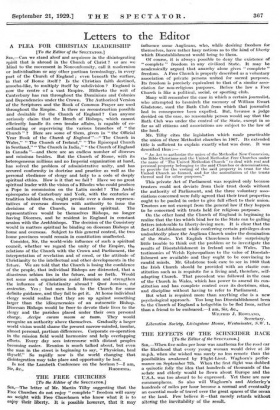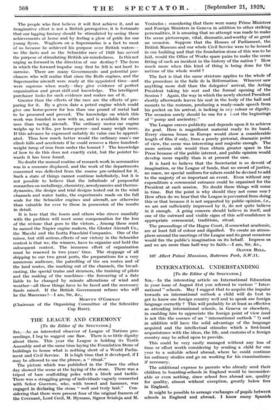THE EFFECTS OF THE SCHNEIDER RACE [To the Editor of
the SPECTATOR.]
Sm,—When five miles per hour was anathema for the road car the likelihood that every young woman would drive at 50 m.p.h. when she wished was surely no less remote than the possibilities awakened by Flight-Lieut. Waghorn's perfor- mance on September 7th. When the first flight was dubbed a quixotic folly the idea that hundreds of thousands of the
sedate and elderly would be flown about Europe and the U.SA. was too absurd to be expressed. Yet these are now commonplaces. So also will Waghorn's and Atcherley's hundreds of miles per hour become a normal and eventually an essential mode of travel over the great spaces of the ocean or the land. Few believe it—that merely retards without altering the inevitability of the result. The people who first believe it will first achieve it, and as imaginative effort is not a British prerogative, it is fortunate that our lagging fantasy should be stimulated by seeing these achievements at home and by feeling a glow of pride for our young flyers. Waghorn on a Supermarine is a fact to most of us because he achieved his purpose over British waters— we like facts and so the Schneider race of 1929 has served the purpose of stimulating British air-mindedness. Is this not urging us forward in the direction of our destiny ? The form in which the forward impulse may first be felt is not hard to surmise. There are many Governments and potential pur- chasers who will realize that since the Rolls engines, and the Supermarine aircraft were ready at the appointed time—and were supreme when ready—they give evidence of perfect organization and great skill and knowledge. The intelligent purchaser looks for such evidence and makes use of it.
Greater than the effects of the race are the effects of pre- paring for it. By a given date a petrol engine which could give one horse-power for less than one pound of metal had to be procured and proved. The knowledge on which this work was founded is now with us, and is available for other uses than racing aircraft. The ordinary motor car engine weighs up to 9 lbs. per horse-power—and many weigh more. If this advance be expressed suitably its value can be appreci- ated. Thus how much better would the ordinary man's car climb hills and accelerate if he could remove a three hundred- weight lump of iron from under the bonnet ? The knowledge of how to do this does not exactly exist, but the pointer to- wards it has been found.
No doubt the normal routine of research work in aeronautics was in a measure displaced, and the work of the departments concerned was deflected from the course pre-ordained for it. Such a state of things cannot continue indefinitely, but it is not possible to believe that the infinitude of purposeful researches on metallurgy, chemistry, aerodynamics and thermo- dynamics, the design and trial designs tested out in the wind channels and water tanks, the experiments made on the full scale for the Schneider engines and aircraft, are otherwise than valuable for ever to those in possession of the results in detail.
It is here that the losers and others who strove manfully with the problem will meet some compensation for the loss of the riclame that goes to the victors.. Among these must be named the Napier engine makers, the Gloster Aircraft Co., the Macchi and the Isotta Fraschini Companies. One of the minor, -but still serious, effects of our victory in the Schneider contest is that we, the winners, have to organize and hold the subsequent contest. The immense effort of organization must be renewed in two years' time. The stoppage of all shipping to our two great ports, the preparations for a very numerous audience, the patrolling of the sea routes and of the land routes, the marking out of the channels, the bread- casting, the special trains and steamers, the training of pilots and the making of the machines—the foreseeing of a date liable to be changed by minute alterations of wind and weather—all these things have to be faced and the necessary funds raised. If the British Government refuses who will be the Maecenas ?—I am, Sir, &c., MERVYN O'GORMAN (Chairman of the Organizing Committee of the Schneider Cup Race).













































 Previous page
Previous page